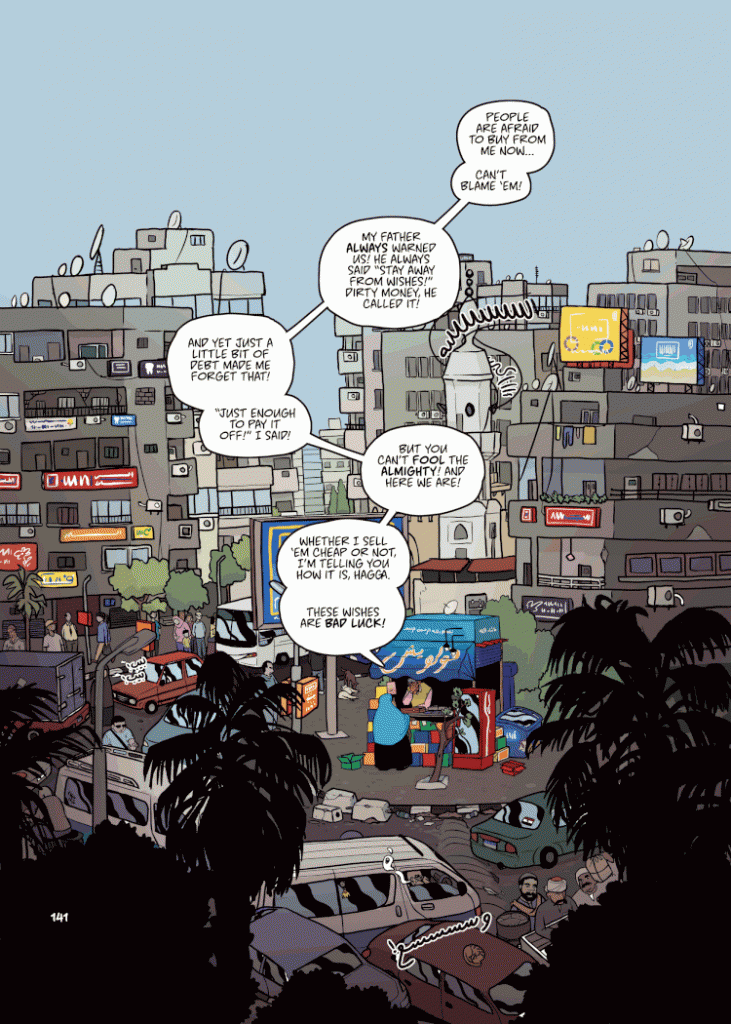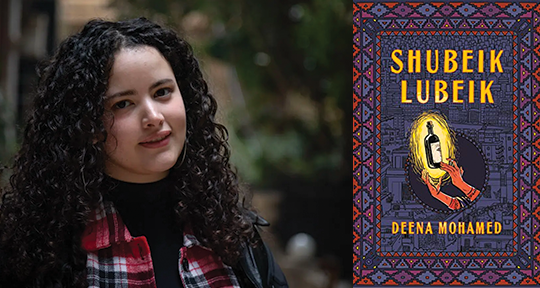Shubeik Lubeik, written, illustrated, and translated by Deena Mohamed, Pantheon, 2023
Shubeik Lubeik, Deena Mohamed’s ingenious graphic novel⸺whose title in Arabic means “Your Wish is My Command” ⸺seamlessly synthesizes Egyptian culture and history into an epic-scale social commentary, invoking direct parallels to the act of translation. Taking place at a Cairo kiosk, with “[its] banners, red iceboxes; [and] brightly colored snacks,” the vivid setting embodies both global capitalist influence and quaint elements of old Egypt, establishing a quirky but believable fictional venue where, among other sundry goods, bottled wishes are sold.
Originally self-published in Arabic as a ninety-page comic book, Shubeik Lubeik won the Best Graphic Novel prize and the Grand Prize at the 2017 Cairo Comics Festival. Mohamed then translated her work into English and sent it to Anjali Singh⸺a literary agent and translator of Marjane Satrapi’s Persepolis⸺who promptly agreed to represent Mohamed. After undergoing extensive developments in subsequent Arabic and English versions, Shubeik Lubeik is now released by Pantheon in its current 518-page incarnation, a magnificent trilogy of connected stories spanning over six decades of Egyptian social history—from 1954 to the present day. Kiosk owner Shokry⸺the seller of three bottled first-class wishes inherited from his pious father⸺serves as the central link to three narratives: Aziza, an illiterate, impoverished widow who refuses to be cowed by Egypt’s corrupt bureaucracy; Nour, a privileged, non-binary college student beset with mental illness; and Shawqia, a plucky matriarch whose life is marked with migration and health issues.

In the first story, Aziza is stubbornly resisting the state’s attempts⸺with its latent bias couched in convoluted wish licensing regulations⸺to deprive her of the ownership of a first-class wish, purchased with hard-earned savings from years of labor. While Aziza initially bought the wish to achieve material comfort, her dogged refusal to give up her wish—which lands her in prison—becomes a moral struggle against the state’s unjust process.
The second story, while also affirming individual choice, takes a different approach. Nour, steeped in material comfort but plagued by chronic depression, cannot decide if they deserve happiness. As a wish studies scholar, Nour is vexed by the gap of knowledge between the wish and its fulfillment. Since a disparity can exist between a wish⸺formed by exigent circumstances⸺and the irrevocable effects of its realization, Nour fears that their wish for happiness won’t alleviate, but perpetuate their exile in an emotional zombie land. READ MORE…

